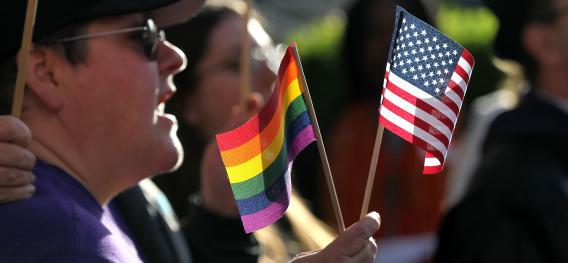The answer to the question is a bit more complicated than it might seem at first glace. As the fight to grant same-sex couples equal rights continues to grow, whether the Supreme Court justices should decide to hear a case on the issue remains a thorny topic. The justices may decide this week whether to hear an appeal from those that defend California’s proposition 8, the 2008 initiative against marriage equality, reports the Los Angeles Times. On Friday, justices could also decide if they’ll hear a case on whether legally married gay couples have a right to equal benefits under the law.
Considering that appeals courts have already struck down parts of the Defense of Marriage Act that denies couples those rights, the justices seem almost certain to take up one of the five cases that seek to overturn the Clinton-era regulation. “I don’t think we’ve ever had an occasion where the Supreme Court has had so many gay rights cases knocking at its door,” Lambda Legal Executive Director Jon Davidson tells the Associated Press. And as the Court readies its decision, the Human Rights Campaign launched a new ad Sunday narrated by Morgan Freeman that pushes for marriage equality, reports the San Francisco Chronicle’s Carolyn Lochhead. (Watch the ad after the jump).
But it’s the case surrounding Proposition 8 that will decide the deeper question of whether marriage equality should be the law of the land. And some gay marriage advocates insist it’s best for the justices to do nothing for now, not only because a majority might vote against marriage equality but also because it could lead to a big backlash that might turn the tide of public opinion. Even Ted Olson, one of the lawyers who led the attack against Proposition 8 is torn, notes the Los Angeles Times.
“We won the case, and if they don’t take it, our clients have won. They will be allowed to marry,” Olson said. “But if they take the case, it could lead to a broader victory.”
